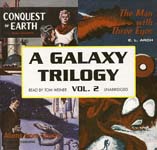
 A Galaxy Trilogy, Vol. 2 – A Collection of Tales from the Early Days of Science Fiction
A Galaxy Trilogy, Vol. 2 – A Collection of Tales from the Early Days of Science Fiction
By David Osborne, E.L. Arch, and Manly Banister; Read by Tom Weiner
11 CDs – Approx. 13 hours [UNABRIDGED]
Publisher: Blackstone Audio
Published: 2009
ISBN: 9781433291081
Themes: / Science Fiction / Aliens / First Contact / Politics / Cold War / Russia / Washington, D.C. / Colorado / Amnesia / Prophecy / Sociology / Iowa / Teleportation /
Back in the 1950s at the dawn of science fiction, writers were turning out wildly imaginative stories for the pulp magazines. Robert Silverberg, writing as David Osborne, estimates he wrote over a million words in one year. Here are three more exciting stories from those heady days from the pioneers of science fiction.
Discs 1 – 3: Aliens From Space by David Osborne (Robert Silverberg)
First published in 1958, under a pseudonym, this Robert Silverberg short novel is set in a fascinatingly futuristic 1989. It is in a period of relative peace on Earth since the recent collapse of communism in Eastern Europe. With this new détente in the offing only an outside influence could disrupt the path to global harmony. And that is exactly what happens when an alien spacecraft lands in an Iowa cornfield. It seems that these aliens have been watching Earth for millennia, and now we are on the cusp of ‘regular interplanetary travel’ these alien beings wish Earth to accept their hand/tentacle in friendship. This aid would be especially needed too as it seems there is another alien species out there in the galaxy – one which would likely destroy the Earth, and all humans, given half a chance. A team of diplomats and scientists from around the world is quickly assembled to negotiate a treaty and alliance. Among them is Professor Brewster, a prominent scientist of psychosociology. He thinks the aliens are hiding something. But could it just be their very alienness? He points out the advanced technology they offer comes with its own problem; receiving technology from an technologically advanced civilization doesn’t advance the recipient’s own culture – it merely makes the culture dependent upon the giver’s civilization. But is that a small cost compared with annihilation?
A friend of mine pointed out that Greg Bear’s 1987 novel The Forge Of God has a similar premise. There are many terrific ideas in the gloriously short novel. Aliens From Space is a kind of cold war apologue, a prisoner’s dilemma situation. Wrong action invites destruction or at the very least, great loss. In a way the Brewster character reminded me of Jared Diamond (of Guns, Germs And Steel fame). Diamond and Brewster, by asking interesting questions, find interesting answers.
Discs 4 – 7: The Man With Three Eyes by E.L. Arch (Rachel Cosgrove Payes)
The Man With Three Eyes is not a terrific Science Fiction novel. But, it is a fair meta-Science Fictional story. It works well as a quasi-period piece/alien invasion story/Agatha Christie-style mystery. It’s set in 1967 New York, more specifically in Greenwich Village. It’s protagonist, I won’t call him a hero, is an Irishman, Dan Gorman. He works as a Science Fiction magazine illustrator and lives in Mrs. Mumble’s boardinghouse. That’s the central location for the plot, as it’s a virtual United Nations of ethnically diverse characters. There’s an Afghan, a German, a Mohawk, a Welshman, an Eskimo (not an Inuit), an Ethiopian, and a refugee from Hong Kong. They all seem to get along pretty well until Dan accidentally places himself in the middle of an alien espionage ring operating out of a dead drop joke shop. There, he picks up a “third eye” and takes it to a party to impress a girl. It doesn’t work like he expects (but then I can’t imagine it’d work at all), and instead acts like the titular object in H.G. Wells’ short story The Crystal Egg (giving the user a vision of aliens on another planet). Dan then leaves the party and looses the eye in his own apartment. The next two thirds of the novel feature everyone hunting for it.
Sound confusing? It is, at least a bit. I found myself wondering how fast E.L. Arch had written The Man With Three Eyes Or if he had written it on a bet. But, like I said, I think it kind of works anyway. It’s not really a good Science Fiction story, but it ain’t a bad story and can probably tell you a lot about how Science Fiction stories were written in the mid 1960s New York. It felt quite a bit like what I imagine time travel to Greenwich Village in the 1960s would feel like.
Discs 8 – 11: Conquest Of Earth by Manly Banister
The aliens came to earth more than two ice ages ago. Now, under millenia of domination by these invaders, one Man amongst a small cadre of six Men with mental powers, elite combat training and a deep education in all things human, can manoeuver to throw off the chains that have sapped Earth of most of its precious resource, water.
Like the Bene Gesserit from Frank Herbert’s Dune, Manly Banister has created a far future quasi-planetary romance with and especially compelling depiction of what it would mean to be trained to detect and interpret every nuance of human physiology. In fact this whole short novel is like a pocket version of Dune – what with all the quasi-religious/scientific ideas, the overlords, the secret societies and the deserty planet-ness. Conquest of Earth may have more ideas per hour as any other audiobook I’ve listened to in the last decade. When Kor Danay (aka the Scarlet Sage) graduates from his training he begins a quick journey across Earth that leads to scenes of assassination, disguise, mind reading and later an unusual trip off-world with a quickly romanced wife named, get this, Soma! One reviewer called the plot “aimless” and “desultory” and I can see that. The whole story feels disjointed in a way that cannot really be understated. Kor has many abilities the set him apart from other people, and even his fellow “Men.” First up, he has the ability to speed up the molecules of his body so as to, from his perspective, stop time! This trope, by the way, was probably first proposed in the The New Accelerator by H.G. Wells, and later by Star Trek in an episode called “Wink Of An Eye.” One lengthy later sequence features another quasi-Star Trek fore-echo too, namely in “The Paradise Syndrome.“ Did I mention that Kor also has a ”Divisible Mind” which may be the key to defeating the enemy Trisz? He does!
In terms of the style of writing, well, there is a nice soliloquized-style explanation of why the Trisz should not be thought of as actually evil despite being insidious energy beings or a being who rule (or rules) the Earth with an iron fist. There is a lot of other zany stuff going on in this novel: teleportation, trickery, a prophetic computer, and a dose of amnesia (for good measure). I will admit Conquest Of Earth comes off as if it was plotted by a mish-mash of meth’d up aliens in order to win a stream of consciousness contest, but somehow it really didn’t seem to bother me. And, I wouldn’t be surprised to hear it had won.
David Osborne is an acknowledged pseudonym of Robert Silverberg. E.L. Arch was a pseudonym of Rachel Cosgrove Payes (being an anagram of her first name: “Rachel”). But it is entirely unclear to me who Manly Banister is or was. There is some discussion of the improbably named Manly Banister HERE, but no Wikipedia article currently exists on this person. Even the narrator name, Tom Weiner, is an alias.
Narrator Tom Weiner’s voice lends depth and presence to the three novels – he adds an appropriate alien lisp to some of the alien speakers, plays around with accents and delivers it all a gravitas and seriousness that doesnt mock this fun material. Listening to A Galaxy Trilogy Volume 2 felt very rewarding!
A minor issue with this collection includes the distinct lack of markings on the discs. 11 CDs are in the set, with three short novels, but none of them is marked with which novels are on which discs. On the other hand, all three novels begin at the beginning of a CD.
Posted by Jesse Willis






